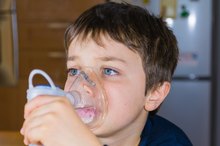What does fact checked mean?
At Healthfully, we strive to deliver objective content that is accurate and up-to-date. Our team periodically reviews articles in order to ensure content quality. The sources cited below consist of evidence from peer-reviewed journals, prominent medical organizations, academic associations, and government data.
- NIH: Expert Panel Report 3 (EPR3): Guidelines for the Diagnosis and Management of Asthma
- NIH: Expert Panel Report 3 (EPR3): Guidelines for the Diagnosis and Management of Asthma
- Chest: Chronic Cough Due to Acute Bronchitis: ACCP Evidence-Based Clinical Practice Guidelines
- Chest: Chronic Cough Due to Acute Bronchitis: ACCP Evidence-Based Clinical Practice Guidelines
- Chest: Airway Inflammation and Etiology of Acute Exacerbations of Chronic Bronchitis
- Chest: Airway Inflammation and Etiology of Acute Exacerbations of Chronic Bronchitis
The information contained on this site is for informational purposes only, and should not be used as a substitute for the advice of a professional health care provider. Please check with the appropriate physician regarding health questions and concerns. Although we strive to deliver accurate and up-to-date information, no guarantee to that effect is made.
Differences Between Asthma and Bronchitis
Asthma and bronchitis are inflammatory lung diseases in which the lower airways swell, resulting in breathing difficulty.
If you are experiencing serious medical symptoms, seek emergency treatment immediately.
Asthma is a chronic disease characterized by recurrent episodes of airway narrowing. Bronchitis can be a short-term or acute illness, typically lasting several weeks, or an ongoing, chronic disease.
Bronchitis involves irritation of the mucous membranes lining the airways. Although some similarities exist, asthma and bronchitis are different diseases with different treatment strategies.
Different Disorders
Acute bronchitis is an infection of the airway lining with a cough that typically lasts several weeks. It is usually caused by a viral infection. Less than 10 percent of cases are due to a bacterial infection, according to the American College of Chest Physicians. The lining of the airways returns to normal after the infection clears. Chronic bronchitis is a more serious disease that occurs primarily in people who smoke or have long-term exposure to air pollutants, causing permanent airway damage and breathing difficulties.
Asthma is a chronic disease that causes inflammation and swelling in the airways. People with asthma experience recurrent episodes of airway obstruction, which is characteristically reversible -- either spontaneously or with medication.
- Acute bronchitis is an infection of the airway lining with a cough that typically lasts several weeks.
- Chronic bronchitis is a more serious disease that occurs primarily in people who smoke or have long-term exposure to air pollutants, causing permanent airway damage and breathing difficulties.
Signs and Symptoms
Causes of Chest Tightness and Cough
Learn More
Symptoms of asthma and bronchitis are similar but with distinctions. People with asthma often experience tightness in the chest, shortness of breath and wheezing during an attack. Acute bronchitis typically causes a hacking cough, with or without phlegm production. Chronic bronchitis is associated with a persistent, phlegm-producing cough and wheezing.
These symptoms are also seen with other lung conditions, so they are not specific enough to make a diagnosis.
Asthma and chronic bronchitis are both characterized by acute flare-ups when symptoms worsen and can be life-threatening. Seek medical attention if symptoms worsen or are not responding to medication.
- Symptoms of asthma and bronchitis are similar but with distinctions.
- People with asthma often experience tightness in the chest, shortness of breath and wheezing during an attack.
Diagnosis
Acute bronchitis is generally diagnosed by a sudden onset of a cough that is not caused by a cold, asthma or a more serious respiratory disease, such as pneumonia. The diagnosis is typically based on medical history, symptoms and a physical examination.
Chronic bronchitis is defined as bronchitis with a phlegm-producing cough lasting at least 3 months for 2 consecutive years. In addition to a history and physical, tests used for diagnosis may include a pulmonary function test to assess airflow in the lungs and a chest x-ray.
Asthma is a more complicated diagnosis that requires tests to check for airway obstruction and the capacity to exhale under different test conditions. The tests will be repeated after use of an inhaled medication to open the airways to determine reversibility of the airflow obstruction.
- Acute bronchitis is generally diagnosed by a sudden onset of a cough that is not caused by a cold, asthma or a more serious respiratory disease, such as pneumonia.
- The tests will be repeated after use of an inhaled medication to open the airways to determine reversibility of the airflow obstruction.
Treatment
Treatment for Asthmatic Bronchitis
Learn More
Acute bronchitis usually goes away on its own.
Because most cases of acute bronchitis are caused by a viral infection, antibiotics are not necessary or effective. In rare cases, bronchodilators -- inhaled medicines that open the airways -- may be prescribed if wheezing accompanies the cough.
Chronic bronchitis treatment typically includes several strategies, including vaccinations for influenza and pneumonia, use of steroids to reduce inflammation, and treatment with antibiotics -- particularly during flare-ups 3. Other treatments may include the use of bronchodilators to dilate the airways or medications to help clear excess mucus.
Asthma treatment focuses on two strategies. Reducing the frequency and severity of attacks is accomplished by limiting exposure to triggers and using so-called rescue medications to treat sudden symptoms.
Controlling the underlying inflammation and constriction of the airways is the other goal of asthma treatment.
Inhaled corticosteroids are commonly prescribed for long-term management of inflammation. Leukotriene modifiers (Singulair, Accolate, Zyflo) and theophylline (Theolair, Theo-24) are other long-term control medications.
Reviewed by: Tina M. St. John, M.D.
- Acute bronchitis usually goes away on its own.
- In rare cases, bronchodilators -- inhaled medicines that open the airways -- may be prescribed if wheezing accompanies the cough.
Related Articles
References
- NIH: Expert Panel Report 3 (EPR3): Guidelines for the Diagnosis and Management of Asthma
- Chest: Chronic Cough Due to Acute Bronchitis: ACCP Evidence-Based Clinical Practice Guidelines
- Chest: Airway Inflammation and Etiology of Acute Exacerbations of Chronic Bronchitis
- American Family Physician: Acute Bronchitis
- National Heart, Lung, and Blood Institute. Bronchitis.
- Kinkade S, Long NA. Acute bronchitis. Am Fam Physician. 2016;94(7):560-565.
- BMJ Best Practice. Acute bronchitis. Updated April 7, 2020.
- Kudo M, Ishigatsubo Y, Aoki I. Pathology of asthma. Front Microbiol. 2013;4:263. doi:10.3389/fmicb.2013.00263
- Asthma and Allergy Foundation of America. Allergens and allergic asthma. Updated September 2015.
- Asthma and Allergy Foundation of America. Medicines can trigger asthma. Updated August 2018.
- Rosenberg SR, Kalhan R. Chronic bronchitis in chronic obstructive pulmonary disease. Magnifying why smoking Cessation still matters most. Ann Am Thorac Soc. 2016;13(7):999–1000. doi:10.1513/AnnalsATS.201605-360ED
- Gentry S, Gentry B. Chronic obstructive pulmonary disease: diagnosis and management. Am Fam Physician. 2017;95(7):433-441.
- Bonnie F, Marianna S, Suzanne L. Patient information series. Pulmonary function tests. Am J Respir Crit Care Med. 2014;189(10):P17-8. doi:10.1164/rccm.18910P17
- Rogliani P, Ora J, Puxeddu E, Cazzola M. Airflow obstruction: is it asthma or is it COPD?. Int J Chron Obstruct Pulmon Dis. 2016;11:3007-3013. doi:10.2147/COPD.S54927
- Albert RH. Diagnosis and treatment of acute bronchitis. Am Fam Physician. 2010;82(11):1345-50.
- Gatheral TL, Rushton A, Evans DJ, et al. Personalised asthma action plans for adults with asthma. Cochrane Database Syst Rev. 2017;4(4):CD011859. Published 2017 Apr 10. doi:10.1002/14651858.CD011859.pub2
- National Heart, Lung, and Blood Institute. Expert Panel Report 3 (EPR3): Guidelines for the Diagnosis and Management of Asthma.
Resources
Writer Bio
Shannon Campbell is a scientist and a small business owner. Based in Boulder, Colo., she is passionate about health and medical technologies. She holds a bachelor’s degree in human biology and biochemistry from the University of Guelph, and a PhD in human physiology from the University of Melbourne.








